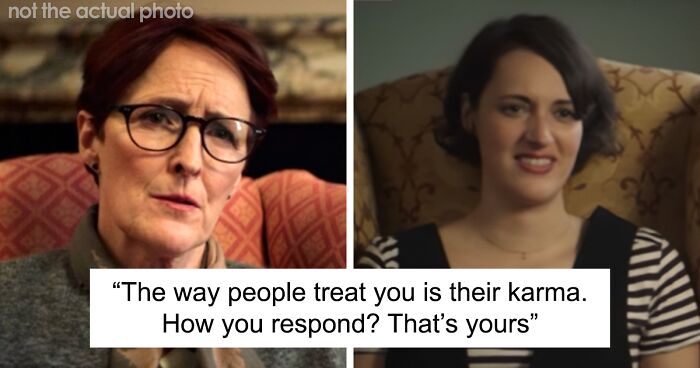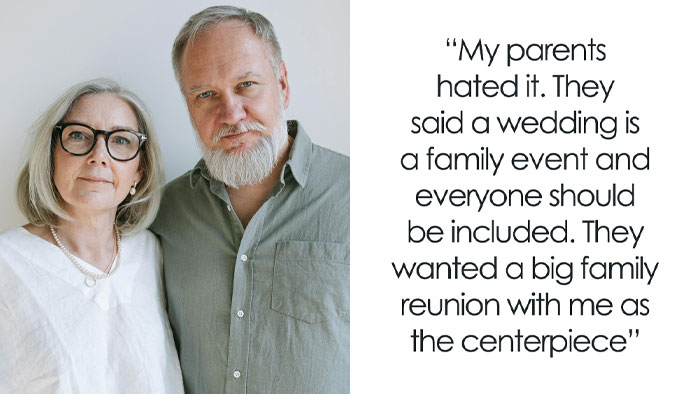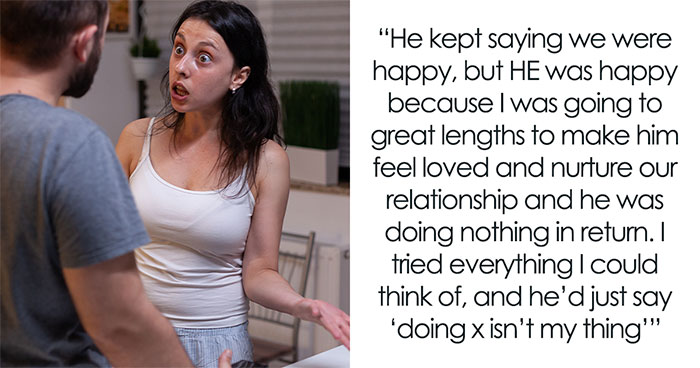You should never put your mental health on the back burner. Make it a priority, alongside your physical health. Always.
Though more and more people are becoming aware of just how vital it is to take care of their mental health, there’s still a certain sense of stigma and taboo when it comes to therapy. Plenty of people see no shame about going to sessions and feel better because of them. However, depending on where in the world you live, going to therapy can be seen as a sign of ‘weakness.’ Hence the lingering stigma.
Some of the most profound things you can learn in life are simple truths and crystal clear wisdom. And internet users from far and wide decided to enlighten everyone by sharing the very best things they’ve ever learned from their therapist in a thread on r/AskReddit. They felt that these things, thoughts, and ideas were something that absolutely everyone should hear.
Scroll down for a serious mediation about self-worth, boundaries, anxiety, and making sense of the world when everyone seems overwhelming and chaotic, Pandas. We’d love to hear your thoughts in the comments, so feel free to speak your mind in the comments. And if you feel like you’d like to share something from your own therapy sessions that you personally found enlightening, go right ahead at the very bottom of this article.
Suzanne Degges-White, a therapist and the author of 'Toxic Friendships: Knowing the Rules and Dealing with the Friends Who Break Them,' kindly answered Bored Panda's questions about the stigma surrounding therapy, how we can tell if we may need counseling, and how to determine whether a therapist is trustworthy. She explained that capable therapists are those who normalize our experiences, make sure we feel heard, and will always keep the focus on us. Degges-White is a Licensed Counselor, as well as Professor and Chair of the Counseling and Higher Education department at Northern Illinois University.
This post may include affiliate links.
 Failure is an idea that not all cultures believe in. Native Americans believe you either succeed or you learn. “Failing” is a social construct designed to control you.
Failure is an idea that not all cultures believe in. Native Americans believe you either succeed or you learn. “Failing” is a social construct designed to control you.
"Admitting we need help isn't easy—in many cultures, there is value placed on self-sufficiency and the ability to work things out on our own. To admit that we're in need of assistance can make us feel like failures. There's a sense of shame for some people, as well. In addition, just acknowledging struggles with mental health—including stress, anxiety, or depression—is still a taboo for many people due to how their families viewed therapy and counseling. It's a challenge to get people into therapy and it can be even more of a challenge to keep them engaged until they've worked through their issues sufficiently," Professor Degges-White explained.
She told Bored Panda that therapy may be useful for a person when they feel like they've run out of solutions for a problem and haven't figured out the right one. Most often, people seek help due to poor relationships: whether with themselves or with others.
"When we feel that no one understands us, or we feel things that don't make sense to us, or we're struggling in a relationship, therapy may provide the means to a resolution. In going into a first session with a therapist, we should be ready to be met with the core conditions of counseling in our therapist—genuineness, unconditional positive regard, and empathy. We should feel that our therapist 'gets us' and makes us feel at ease as we open up," Degges-White shared what we ought to expect when first starting sessions with a professional. It's important to recognize whether the fit between the therapist and the client is right or not.
 Just because you knew someone who had it worse does not mean your situation wasn't abuse as well.
As a non-combat veteran: just because I wasn't getting shot at doesn't mean I don't deserve VA assistance for the PTSD caused by my military role.
Just because you knew someone who had it worse does not mean your situation wasn't abuse as well.
As a non-combat veteran: just because I wasn't getting shot at doesn't mean I don't deserve VA assistance for the PTSD caused by my military role.
 “No.” Is a complete sentence
“No.” Is a complete sentence
"We should also recognize that it can be weird, at first, to open up to a stranger, but also feel that as we do self-disclose, the therapist supports us as we risk being open and honest. Not every therapist fits every client—sometimes we might have to engage in a couple of 'misses' before we find the therapist who is right for us. However, we shouldn't give up trying—when we have the courage to reach out, it means that we are ready for change—keep up the motivation to work on the issue that's keeping you from moving forward."
According to Professor Degges-White, one of the most important things that one's therapist can do for us is to normalize our experiences. They help provide a broader picture. "When we feel that our own struggles are not so unusual or unexpected and we're not 'crazy,' that helps us feel better about seeking help. In addition, when a therapist really listens deeply to us, that can be healing in itself. There is a great deal of power in talk therapy—being able to find a space to say out loud what we need to say is so liberating!"
What's more, therapists ensure that we feel heard. They also validate our perspectives, which, according to the professor, may be "immensely beneficial."
"Trustworthy therapists will focus on you, not their clocks or their phones, when you're in session. They will behave professionally—they won't be late for appointments, they won't cancel and re-schedule appointments unless a rare emergency strikes, they will keep the focus on YOU and not derail therapeutic conversations to inappropriately self-disclose about their own problems."
 You can bring up your mood if you reframe your thinking.
Instead of being annoyed that you have to clean your cat boxes, be grateful that you have an animal who keeps you company.
Having to wash dishes means that you got to eat a meal.
Having to take someone to the airport means that you have friends/family in your life that trust you.
You can bring up your mood if you reframe your thinking.
Instead of being annoyed that you have to clean your cat boxes, be grateful that you have an animal who keeps you company.
Having to wash dishes means that you got to eat a meal.
Having to take someone to the airport means that you have friends/family in your life that trust you.
Gratitude. When I'm in the depths of depression, I have to make myself do this every day, even if I can only come up with one thing to be grateful for. It takes practice and perseverance, and some days I don't manage it. Refer to the other post about "progress, not perfection". 🙂
 That all emotions have their time and place. Also that I can’t control how other people feel. It’s not my job to keep them happy or satisfied. I am allowed to let people be angry or upset.
That all emotions have their time and place. Also that I can’t control how other people feel. It’s not my job to keep them happy or satisfied. I am allowed to let people be angry or upset.
This is so true. I often obsess over whether people are enjoying themselves when we go somewhere to the point that I'm not enjoying myself.
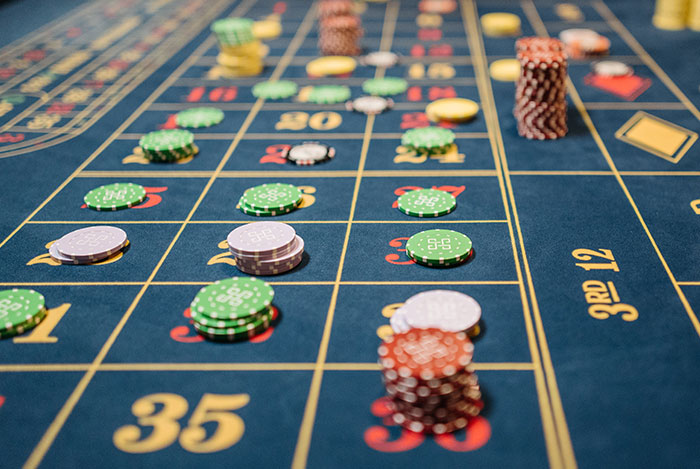 You have a limited amount of energy and time in any given day, and you get to choose where you place that energy. Like chips at a roulette table.
Every angry twitter response, Reddit argument, etc is me putting those chips on those squares. My stack dwindles each time.
Angry thoughts about a news article, an opinion I disagree with, that a*****e driver on the freeway, all of that takes energy, my chips. An extremely limited resource.
So I’m trying to live though that lens and make the best possible decisions with my stack. That a*****e driver gets none of my chips anymore. YA CANT HAVE EM F**KFACE.
Today I was about to have a negative interaction online so I got up and pet the ever loving s**t out of my cat instead. Like world class scratches - he was stoked.
Chips. Place them wisely.
I stop myself many times a day from doing it. I’m much happier now. Still f****d up, but happier in my stew if that makes any sense.
You have a limited amount of energy and time in any given day, and you get to choose where you place that energy. Like chips at a roulette table.
Every angry twitter response, Reddit argument, etc is me putting those chips on those squares. My stack dwindles each time.
Angry thoughts about a news article, an opinion I disagree with, that a*****e driver on the freeway, all of that takes energy, my chips. An extremely limited resource.
So I’m trying to live though that lens and make the best possible decisions with my stack. That a*****e driver gets none of my chips anymore. YA CANT HAVE EM F**KFACE.
Today I was about to have a negative interaction online so I got up and pet the ever loving s**t out of my cat instead. Like world class scratches - he was stoked.
Chips. Place them wisely.
I stop myself many times a day from doing it. I’m much happier now. Still f****d up, but happier in my stew if that makes any sense.
Previously, Bored Panda spoke about therapy and counseling sessions with British psychotherapist Silva Neves. He noted that, though there’s still a certain stigma still attached to seeking help for one’s mental health, the situation is far from as bad as it used to be before.
"I think it is getting better and there is less stigma seeing a therapist now. It depends on your location though, there are still some parts of the world where therapy is still a taboo. Some people think that seeing a therapist means that you're 'crazy,' but this is not actually what therapy is about," he explained what therapy is and is not.
"Therapy is a confidential and private space where you can get help from a professional with anything that bothers you, from your work problems, relationship issues, or other psychological problems such as post-trauma stress, depression, and anxiety," the therapist told Bored Panda.
"Those things are actually very common and many people struggle with these things, it doesn't mean they're crazy. Seeing a therapist when you have emotional struggles should be as normal as seeing your doctor when you have a physical problem. But at the moment, our society hasn't normalized therapy yet. It is changing with famous people talking about the benefits of therapy such as Lady Gaga and Prince Harry,” he noted that therapy is becoming more and more widely accepted because it’s a topic that well-known individuals talk about in public.
 How people act is a reflection of them, not me.
How people act is a reflection of them, not me.
Mostly yes. But people sure act nicer, if you are kind to them first
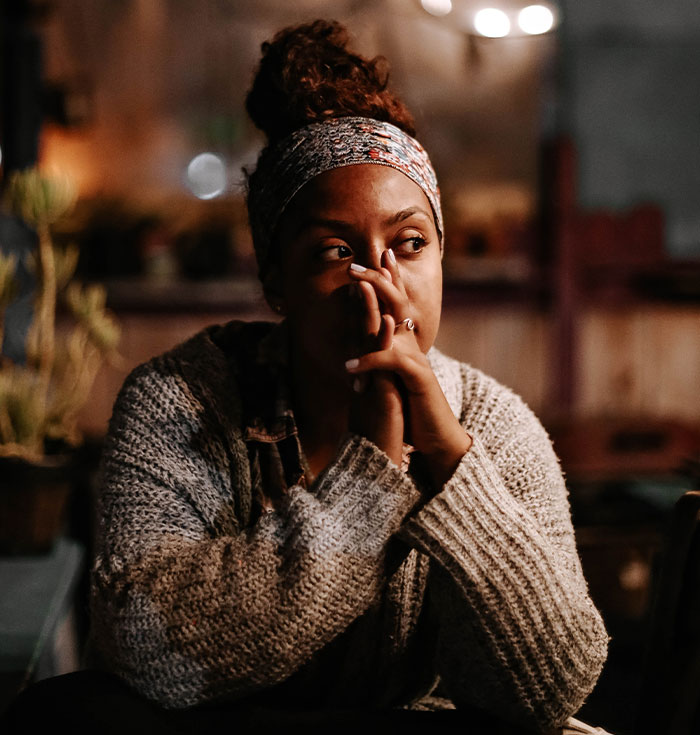 If you take good thoughts with a grain of salt why not also take the bad with a grain of salt? Hear it, recognize it, and let it leave.
If you take good thoughts with a grain of salt why not also take the bad with a grain of salt? Hear it, recognize it, and let it leave.
 A counselor at my university taught me that just because your anxiety tells you something will happen, that doesn't make it true. One way to illustrate this is to place a pen on a table, tell yourself you won't be able to pick it up, and then do it anyway. It feels so weird but also so comforting to know that your thoughts don't have as much influence on your life as they want you to believe. The therapist who told me this was just an intern at the time. I really hope she has been able to help people the same way she did me where ever she is now.
A counselor at my university taught me that just because your anxiety tells you something will happen, that doesn't make it true. One way to illustrate this is to place a pen on a table, tell yourself you won't be able to pick it up, and then do it anyway. It feels so weird but also so comforting to know that your thoughts don't have as much influence on your life as they want you to believe. The therapist who told me this was just an intern at the time. I really hope she has been able to help people the same way she did me where ever she is now.
While your mental health is of paramount importance, so is your physical health. Taking care of your mind means, in large part, being kind to your body. That means getting plenty of movement every day, eating in a healthy and balanced way, staying hydrated, and getting enough sunlight.
Then there’s the social aspect to consider, too. People are hardwired to be social beings. Our brains reward us for socializing and being kind to others. That means that in order to have a healthy and happy life, you need to have a strong group of family, friends, and coworkers on whom you can rely.
 People don’t know what you’re thinking or wanting if you don’t say it. If you don’t communicate your emotions and thoughts, you can’t expect people to mind-read, and then get upset at them for not doing what you expected.
People don’t know what you’re thinking or wanting if you don’t say it. If you don’t communicate your emotions and thoughts, you can’t expect people to mind-read, and then get upset at them for not doing what you expected.
I dealt with this so much from my narcissistic father, I blatantly ignore (or deliberately misinterpret) passive-aggressive subtext until they say what they mean.
 We judge others based on their actions but we judge ourselves based on our intentions.
We judge others based on their actions but we judge ourselves based on our intentions.
 My mom was a terrible person, and the therapist told me i didn't need to treat her as if she was a loving mother. I was doing all the things a good daughter does for a mother that loves them, however i didnt have a mother that treated me as though she loved me. It was life changing to realise this and really helped me stop being abused by her.
My mom was a terrible person, and the therapist told me i didn't need to treat her as if she was a loving mother. I was doing all the things a good daughter does for a mother that loves them, however i didnt have a mother that treated me as though she loved me. It was life changing to realise this and really helped me stop being abused by her.
Making time for them is essential to keeping your mind healthy. While some people prefer taking more time for themselves, no person (with some extremely rare exceptions) can function completely in isolation. We need others. However, having just anybody in your life—whether romantically, platonically, or otherwise—won’t cut it. You have to have people in your life who will lift you up instead of those who put you down. Clear boundaries and honest communication can help you filter out who’s a true and steadfast friend and who’s just here while the weather’s fair.
The hardest step is the first one. If you have any advice about starting therapy that you'd like to share with all the other Pandas, dear Readers, feel free to do so. A helping hand, a kind word, a bit of support: these are things that can make a huge difference, even if they come from a stranger on the internet.
 Overworking is a form of self harm.
Overworking is a form of self harm.
 People aren't always looking and thinking about you if you're in public. If you enter a room full of people and they all turn to look at you, it's just a knee-jerk reaction to movement/noise, they literally won't even think about you past "this person just entered the room"
Helped soo much with social anxiety.
People aren't always looking and thinking about you if you're in public. If you enter a room full of people and they all turn to look at you, it's just a knee-jerk reaction to movement/noise, they literally won't even think about you past "this person just entered the room"
Helped soo much with social anxiety.
Yep. If I'm sat facing a door I'll look every time someone comes in, file them under "unknown variable", and continue the conversation I was already having.
 Not from a therapist, but from pre-marital counseling:
Don’t try to “win” an argument with your spouse. It’s the two of you vs. the problem, not the the two of you vs. each other.
Not from a therapist, but from pre-marital counseling:
Don’t try to “win” an argument with your spouse. It’s the two of you vs. the problem, not the the two of you vs. each other.
Some christian churches & religious organizations actually require pre marital counseling prior to performing the ceremony. All 3 of my sisters & their soon to be husbands had to do this before being married in the church they were raised in.
 Progress not perfection.
As someone who has *extremely* high standards for myself I have to repeat this on the daily
Progress not perfection.
As someone who has *extremely* high standards for myself I have to repeat this on the daily
 To not make permanent decisions whilst in a highly emotional state
To not make permanent decisions whilst in a highly emotional state
 My worth is not determined by my productivity.
Being raised by a workaholic Marine and then having a series of nightmare bosses led me to have a severe guilt spiral if I spent a most of day not "doing" something.
My worth is not determined by my productivity.
Being raised by a workaholic Marine and then having a series of nightmare bosses led me to have a severe guilt spiral if I spent a most of day not "doing" something.
This was a change for me when I started working from home. I felt guilty starting that load of laundry. Or running to the coffee shop on the clock. But if the work gets done, what does it matter? I just work faster than my colleagues because I’m better and more familiar with technology.
 People don’t care. They are not talking behind my back or thinking how I’m fat and ugly or that my shoes are wrong. People don’t care about me. And if they are? Who cares? Literally changed my anxiety. Also works in the sense that most people in my life have not cared about me and I need to stop trying to please people that don’t care about ME.
People don’t care. They are not talking behind my back or thinking how I’m fat and ugly or that my shoes are wrong. People don’t care about me. And if they are? Who cares? Literally changed my anxiety. Also works in the sense that most people in my life have not cared about me and I need to stop trying to please people that don’t care about ME.
 You cannot help people unless and until you help yourself.
My therapist asked me how I would explain the scars I had to future partners or future children one day. Do you want them to know that you were in a not so good place with your mental health but got help or do you tell them nothing?
Also when I was a teenager and had just been released from the adolescent inpatient ward, I was nervous about going back to school, my therapist just looked me straight in the eye and said I owed no one any explanations but I also could tell people nicely to get bent.
She is one of the reasons why I became a social worker.
You cannot help people unless and until you help yourself.
My therapist asked me how I would explain the scars I had to future partners or future children one day. Do you want them to know that you were in a not so good place with your mental health but got help or do you tell them nothing?
Also when I was a teenager and had just been released from the adolescent inpatient ward, I was nervous about going back to school, my therapist just looked me straight in the eye and said I owed no one any explanations but I also could tell people nicely to get bent.
She is one of the reasons why I became a social worker.
 I’ve struggled with infertility and I’m now sterile. It was a b***h to get through but my therapist taught me a few things.
Other peoples situations have nothing to do with me. People I’m close to are going to get pregnant and have kids. It’s ok for me to feel jealous and upset for a bit but that I needed to realize that it’s a part of life, and holding onto that anger wasn’t going to be good for me. Let it go. I still get bitter sometimes but I find it easier to let it go now and not let it consume me.
To not blame myself. I kept coming up with reasons for my infertility, things I thought I could’ve done differently and maybe if I did this or didn’t do that this wouldn’t have happened to me when in all actuality there wasn’t anything I really could’ve done. I have a medical condition and I got the s**t end of the stick.
Not to feel guilty. I felt so much guilt, because my husband wants to be a father so badly. I sometimes felt so bad he married me, and thought I wouldn’t blame him if he left me for someone who could give him children. He’s told me again and again he loves me and if we never have kids it’s ok because he has me. I didn’t feel I deserved that kind of love and sometimes it’s hard to accept but I’m so grateful for it. I do deserve love, I’m more than my ability to have children and it’s been a hard road to finally start having some acceptance of that.
If I hadn’t met my therapist I think I would just be in such a terrible state.
I’ve struggled with infertility and I’m now sterile. It was a b***h to get through but my therapist taught me a few things.
Other peoples situations have nothing to do with me. People I’m close to are going to get pregnant and have kids. It’s ok for me to feel jealous and upset for a bit but that I needed to realize that it’s a part of life, and holding onto that anger wasn’t going to be good for me. Let it go. I still get bitter sometimes but I find it easier to let it go now and not let it consume me.
To not blame myself. I kept coming up with reasons for my infertility, things I thought I could’ve done differently and maybe if I did this or didn’t do that this wouldn’t have happened to me when in all actuality there wasn’t anything I really could’ve done. I have a medical condition and I got the s**t end of the stick.
Not to feel guilty. I felt so much guilt, because my husband wants to be a father so badly. I sometimes felt so bad he married me, and thought I wouldn’t blame him if he left me for someone who could give him children. He’s told me again and again he loves me and if we never have kids it’s ok because he has me. I didn’t feel I deserved that kind of love and sometimes it’s hard to accept but I’m so grateful for it. I do deserve love, I’m more than my ability to have children and it’s been a hard road to finally start having some acceptance of that.
If I hadn’t met my therapist I think I would just be in such a terrible state.
 I had confidence issues and the therapist said "on a scale from 1 to 10 with 10 being a famous movie star with millions of fans, and 1 being a homeless person screaming at people on the street. 5 being you can hold a conversation where do you put yourself." I realised I wasn't as bad as I thought.
I had confidence issues and the therapist said "on a scale from 1 to 10 with 10 being a famous movie star with millions of fans, and 1 being a homeless person screaming at people on the street. 5 being you can hold a conversation where do you put yourself." I realised I wasn't as bad as I thought.
This shows a lot about the judgement and disrespect the therapist has for unhoused folks with mental illness… wow. As a therapist working with highly vulnerable populations, this attitude is very sad and complicit with a sick system.
 You know, most people don't actually feel guilty when saying "no" to someone or something. They don't rush to "fill the gap", or find alternative solutions that make everyone happy, or dwell on the awfulness of it all. They just say "no" and move on to the next thought.
I don't know why it was such a startling revelation, but it made sense immediately after I heard it.
You know, most people don't actually feel guilty when saying "no" to someone or something. They don't rush to "fill the gap", or find alternative solutions that make everyone happy, or dwell on the awfulness of it all. They just say "no" and move on to the next thought.
I don't know why it was such a startling revelation, but it made sense immediately after I heard it.
 If you spend time stressing or worrying about something that *might* happen or *before* it happens, you're putting yourself through it twice. If worst case scenario *does* happen, then once is enough.
If you spend time stressing or worrying about something that *might* happen or *before* it happens, you're putting yourself through it twice. If worst case scenario *does* happen, then once is enough.
Not sure I completely agree with this. If I know a bad situation is possible. It helps me to think it through with a reasonable response so that I am not caught off guard. I am able to face a situation with a pre planned response. It’s no different than physically being prepared for a disaster. Like the saying goes: “It’s better to have it and not need it, then to need it and not have it.”
 She told me not to think about a Pink Elephant.
I didn’t know what she meant at the time, but she gave me a few moments to think. I was trying not to think about a pink elephant but it’s all I could think about because she told me not to think about it. After the time was up, she asked me what I was thinking about. I told her I was thinking about a pink elephant.
She told me that the more you try not to think about something, and push it to the back of your mind; the more you tend to think about it. This is why my thoughts were consuming me and I was having awful flashbacks.
Thanks to her, I have been able to manage my PTSD, depression and anxiety. She was lovely.
She told me not to think about a Pink Elephant.
I didn’t know what she meant at the time, but she gave me a few moments to think. I was trying not to think about a pink elephant but it’s all I could think about because she told me not to think about it. After the time was up, she asked me what I was thinking about. I told her I was thinking about a pink elephant.
She told me that the more you try not to think about something, and push it to the back of your mind; the more you tend to think about it. This is why my thoughts were consuming me and I was having awful flashbacks.
Thanks to her, I have been able to manage my PTSD, depression and anxiety. She was lovely.
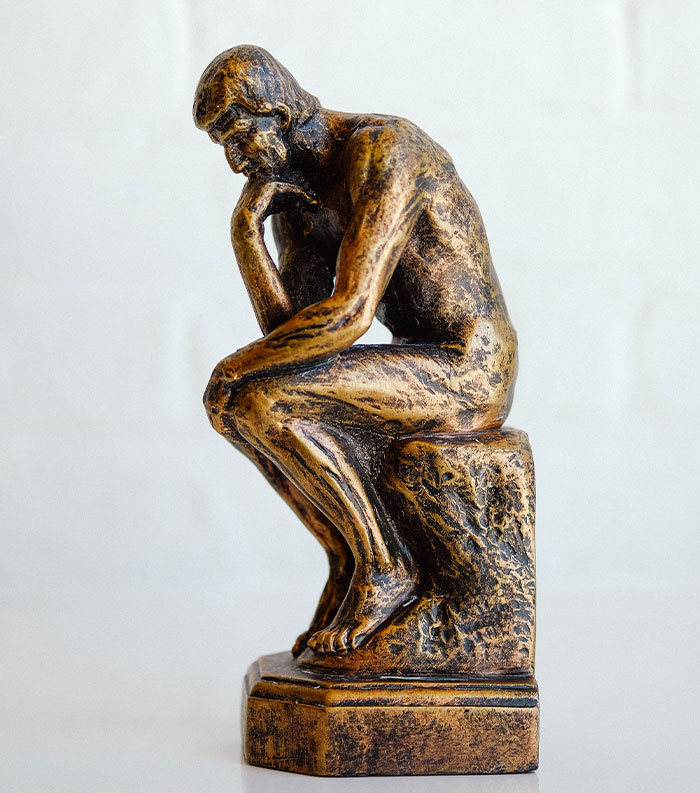 Just because you think a thought, it does not mean that thought controls your destiny or defines who you are. Our minds come up with some really weird s**t... and that's okay. They're just thoughts. How we choose to feel or act is what really counts.
Just because you think a thought, it does not mean that thought controls your destiny or defines who you are. Our minds come up with some really weird s**t... and that's okay. They're just thoughts. How we choose to feel or act is what really counts.
 That my traumatized child self still lives rent free in my head, and that's okay, but that we are not the same person any more, so their fears and hurts should not stop my present from being happy.
That I don't have to prove my worth through deeds and self-sacrifice. My worth is intrinsic.
That people can love you and mean well and still hurt me, so I shouldn't be afraid to voice those hurts.
Those are just a few. She was great.
That my traumatized child self still lives rent free in my head, and that's okay, but that we are not the same person any more, so their fears and hurts should not stop my present from being happy.
That I don't have to prove my worth through deeds and self-sacrifice. My worth is intrinsic.
That people can love you and mean well and still hurt me, so I shouldn't be afraid to voice those hurts.
Those are just a few. She was great.
 People lie with their words not their actions.
People lie with their words not their actions.
I don't know, maybe ask any groomed or jilted lover or so if actions can't lie.
 Be kind and unconditionally loving toward yourself as though you were a little kid. A lot of us still have some trace of feeling like a child left within us, but we can still be inwardly harsh and cruel in ways we would never be to the softest parts of ourselves if they were manifested into another being.
Be kind and unconditionally loving toward yourself as though you were a little kid. A lot of us still have some trace of feeling like a child left within us, but we can still be inwardly harsh and cruel in ways we would never be to the softest parts of ourselves if they were manifested into another being.
 You have to advocate for yourself because nobody else will.
You have to advocate for yourself because nobody else will.
 I can't fix something I can't face.
She compared it to a garishly painted room in your home. If you cannot face the fact that it has a terrible decor, then you'll just shut the door and avoid it. But every time you walk by the closed door, it causes tension and anxiety.
Gotta open the door. Gotta assess what's wrong, truly and honestly face it, then plan how to re paint. It's the only way. If you blindly enter and frantically throw whitewash over it, it'll just make it worse.
I can't fix something I can't face.
She compared it to a garishly painted room in your home. If you cannot face the fact that it has a terrible decor, then you'll just shut the door and avoid it. But every time you walk by the closed door, it causes tension and anxiety.
Gotta open the door. Gotta assess what's wrong, truly and honestly face it, then plan how to re paint. It's the only way. If you blindly enter and frantically throw whitewash over it, it'll just make it worse.
 There are only two things in life I HAVE TO DO:
1. I have to die one day
2. whatever I decide to do, I have to live with the consequences
The rest is completely up to me.
I had problems with perfectionism and burnout and eventually everything stressed me out because I had the feeling that I had to do things for my job and felt trapped in it, for my family etc all the time and I completely lost myself. So this changed a lot for me.
I don't have to be productive all day but I can decide to be. I don't have to do the dishes for example. The consequence is that I'll come into a dirty kitchen the next morning and I hate that. So instead of having do to it (and feel overwhelmed by "all the work I have to do"), I decide that I'd rather WANT to do it.
Change the wording. It doesn't sound like much but it changed everything for me.
There are only two things in life I HAVE TO DO:
1. I have to die one day
2. whatever I decide to do, I have to live with the consequences
The rest is completely up to me.
I had problems with perfectionism and burnout and eventually everything stressed me out because I had the feeling that I had to do things for my job and felt trapped in it, for my family etc all the time and I completely lost myself. So this changed a lot for me.
I don't have to be productive all day but I can decide to be. I don't have to do the dishes for example. The consequence is that I'll come into a dirty kitchen the next morning and I hate that. So instead of having do to it (and feel overwhelmed by "all the work I have to do"), I decide that I'd rather WANT to do it.
Change the wording. It doesn't sound like much but it changed everything for me.
That helping others is a way of avoiding helping myself.
You can only physically cry for about an hour and a half… I always held back from letting it all out and having a good cry because I was scared I wouldn’t be able to stop. She told me to embrace the tears and let it out as my body would shut it down after 90 min. She was right.
I'm wondering if she told you it's an hour would your body "shut down" after 60 mins - the power of mind?
That there are no pre-conditions that need to be met before you set a boundary. I spent decades of my life trapped wondering how my needs might make people feel, or what they might think. Turns out, my needs are valid and I don't need permission to express them to the world. Go figure!
 That a lot of the things I dread that I “have to do” are completely optional things that I don’t in fact have to do. I remember my psychiatrist listening to me talk about seeing a family member and how difficult our relationship can be and how the holidays were stressful because of the extra time around them, and he just said “You don’t have to be around them.”
And it’s more complicated than that, most things are, but it was kind of the first time that I started to see that my time is valuable and that I don’t have to do things that affect me negatively.
That a lot of the things I dread that I “have to do” are completely optional things that I don’t in fact have to do. I remember my psychiatrist listening to me talk about seeing a family member and how difficult our relationship can be and how the holidays were stressful because of the extra time around them, and he just said “You don’t have to be around them.”
And it’s more complicated than that, most things are, but it was kind of the first time that I started to see that my time is valuable and that I don’t have to do things that affect me negatively.
This is not really good mindset if you're dealing with anxiety and avoidance tho 😬
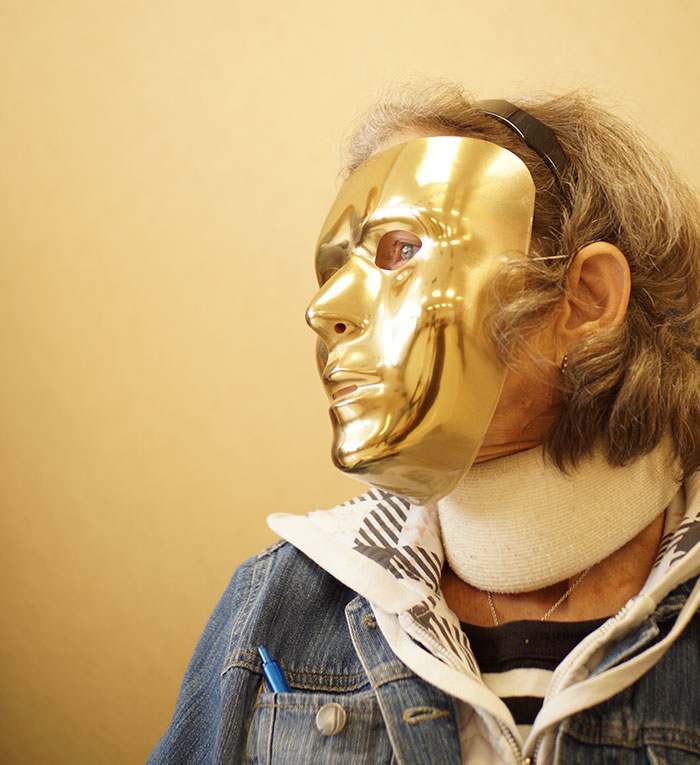 That what happened to me was not my fault
That what happened to me was not my fault
 If you are anxious around crowds, try to observe instead of walking your mind how you might look, how to act, how to be funny, what they think about you etc...
This technique of not turning into myself but actively trying to just observe made me not only a better listener, but much less awkward, too.
If you are anxious around crowds, try to observe instead of walking your mind how you might look, how to act, how to be funny, what they think about you etc...
This technique of not turning into myself but actively trying to just observe made me not only a better listener, but much less awkward, too.
I resonate with this feeling. Most times my anxiety is taking over, it's because I'm focusing too much inward. And the truth is that no one else is really watching/caring. Refocusing outward becomes like a new superpower, because you get out of your head, and are probably observing a lot that others miss
Got lucky and ended up with a great therapist. Some might ask you about your upbringing or your parents and try to dig into your past for answers. Some will teach you to have higher self. Mine taught me to have no esteem. Don’t carry around a story of myself with me all the time. Just to live in the moment and be present. He taught me the difference between the mind and awareness. He didn’t care about my past or my upbringing. Just taught me a different way of thinking, a different mindset. Not a lot bothers me anymore. I feel a lot more like my younger self before I developed an ego. That’s really the point. To no longer try to satisfy the ego because it’s insatiable. You can never fulfill it.
This one really resonates. I have had that flash of "why hasn't this past b.s. been an issue with me before". I never worried about my upbringing when I left home at 18 because I was leaving it all behind and looking to the future. It wasn't until the world made me think there was something wrong with me that I started looking for reasons why in my past. I remember the day I figured out everyone's past is a bit f***ed up and I was no worse than any of them. I've just never been able to figure out how not to obsess over my image to others. I think I'm gonna look into it further.
"Giving someone a puppy is a nice gesture, but not if they weren't asking for one." The lesson was that your intentions, that may be coming from a good place, are not always welcomed by someone else and can be perceived as a burden or extra responsibility to consider in daily life. Got me to step back from the situation I was trying my best to "fix" and evaluate the motivations for my behavior and actions. Some things cannot be fixed by doing "nice" things. Early-20s were a rollercoaster.
 You have to accept yourself (the good and the bad) for who you are in order to love yourself and make healthier decisions. It isn't healthy to complely block out, ignore, or deny those less desirable parts of yourself because they always come back to haunt you.
But remember that the *good you* is in control.
Think of yourself as a bus driver with your passengers being different aspects of your personality, each with a different way of thinking and unique emotional state of being.
Regardless of whether or not passengers are following the rules, it is your job to get them to their destinations safely.
However, if a passenger is a troublemaker (eg. an aspect of your personality that leads to bad decisions) and tries to take over the steering wheel, just tell them, "I appreciate you wanting to drive for me [fill in the blank], but right now I don't need you. Please have a seat in the back of the bus."
There's a bit more to it, but this analogy really stuck with me.
You have to accept yourself (the good and the bad) for who you are in order to love yourself and make healthier decisions. It isn't healthy to complely block out, ignore, or deny those less desirable parts of yourself because they always come back to haunt you.
But remember that the *good you* is in control.
Think of yourself as a bus driver with your passengers being different aspects of your personality, each with a different way of thinking and unique emotional state of being.
Regardless of whether or not passengers are following the rules, it is your job to get them to their destinations safely.
However, if a passenger is a troublemaker (eg. an aspect of your personality that leads to bad decisions) and tries to take over the steering wheel, just tell them, "I appreciate you wanting to drive for me [fill in the blank], but right now I don't need you. Please have a seat in the back of the bus."
There's a bit more to it, but this analogy really stuck with me.
Not my therapist, but my father was a clinical psychologist for about 35 years. “Never ascribe rational behavior or thought to a fundamentally irrational person.” My MIL had extensive mental health problems and several self-destructive tendencies as a result. You can’t reason her into good behavior because she didn’t reason herself out of it.
 You have choices, you have options and despite what people may tell you, remember it's never up to anyone else. You are always in charge of your life.
You have choices, you have options and despite what people may tell you, remember it's never up to anyone else. You are always in charge of your life.
Focus on what you can control.
That I am enough. I don't need to seek validation from others in order to feel like I belong and if I don't belong, that's okay.
The biggest one that stuck with me is “you are not responsible for other peoples emotions” When he said it initially I blew it off, but I really thought about it on my way home and it has stuck with me so much since then (nearly 5 years ago) Saved my life quite literally and has lead to some of the best years of my life.
That I had 100% been slapped across the face by life for about ten years straight and was completely justified in being “Broken”… I had lived most my life wondering why I just can’t function like my Friends and/or Family. Tons of comparisons, every minute of every day, living with massive Anxiety and Depression just always saying to myself “Why can’t I just ______?”. One day, years into therapy, he sends me home with a project; We called it my “Timeline of Tragedy”. From the time I was a teen well into my late twenties I had not gone a single year, sometimes just months, without losing someone close, often tragically, or watching someone die in a random event… seemed to always be me finding the body or being “First on Scene”; Heart Attacks (Yes, multiple), ODs (also multiple) Suicides (You get the idea), Gunshot wounds, Traffic accidents/DUIs, you name it. I lived most my life assuming people have seen the things I’d seen and just went about their day and I judged myself so harshly for not being “Normal/Functional”… turns out, most people haven’t gone through even a fraction of that. I got b***h slapped by life for a while and just assumed “That’s life”. However, now knowing that, the self judgment disappeared, I was willing to work on myself in a much healthier way, my Anxiety was more manageable, and I’ll forever remember how monumentally that single day/project in Therapy changed my entire life.
I had therapy a few times but the first made me notice that when I related why I was in not such a good way that my therapist actually looked shocked. I was sure they were supposed to be impassive. She wasn't. Made me realise my life had been genuinely awful and I had good reason to feel how I did..
That I wasn’t an unreasonably angry child like I was told all throughout childhood. I was a trauma survivor who displayed blatant signs of ptsd. Only then did I recognize that I was a victim and that I do still suffer from ptsd. My therapist helping me to acknowledge the hurt and pain definitely helped to kickstart the healing.
The only way out is through. I spent years trying to move past my trauma and negative thinking by pushing it down and trying to be positive in its place. But by doing so, I was invalidating it to myself. The only way I was ever able to heal from it was to accept that it happened and allow myself to grieve/feel that pain.
The grief and pain wait for you. They don't go away until you go through it. They're very patient.
I was a counselling student - things I learnt from my professor: 1. Any decide you made at any moment, was the best decision you could have made. Even ‘if you could go back’ and tell yourself not to do something, you will and it’s okay. 2. Whatever it is, you are most likely to get over it. Feel it, process it and move on. Digging into it at all times will not do any good, take your time, and slowly drop it. Therapy is to process and move on, not discuss things to death.
I started seeing a therapist when I was diagnosed with an autoimmune disease last year. At the time it was severe and it consumed me entirely, it was like nothing else existed in my world. I was in pain all the time and honestly just wanted to die. She told me “you are not your disease” and it made me cry lol. I had been so caught up in it I didn’t really see myself as a person apart from that. Yes it’s a part of me that I’ll never get rid of, but there are other aspects to me as well. She made me feel like a person again. I think it’s important not to get too caught up in any one thing - don’t let just one thing define you. You’re a whole person with many interests, ideas, ambitions, pastimes, etc. If one thing goes downhill, you’ve always got other things going for you.
Praise the effort, not the goal. If you judge success ONLY by where you want to be, you’ll have more failures than success. Give yourself a break and be proud of yourself for even the smallest strides you take.
I think one of the best things you can learn from a therapist is how to forgive yourself. It's tough out there and sometimes we are tougher on ourselves than we know. Took me a LONG time to forgive myself in my problems. And take my word for it, after you spend years blaming others (rightfully so too) it can be hard looking at yourself
You can quit a job if it’s hurting you. I had a nervous breakdown when I started my first bar management job. New mom working 60-70 hour weeks for a woman that was an alcoholic. When I wasn’t at the restaurant I constantly got phone calls and texts. I felt like I was trapped. My therapist compared it to an abusive boyfriend. YOU are forever, jobs are not and no job is worth losing yourself over.
Please leave toxic jobs. I had a terrible, manipulative boss who very literally made me not care about life. I wasn’t in a state of self-h arm but at the same time, I didn’t care if anything happened to me. Finally got out of there and it made all the difference. It’s not worth it! I promise!
How to meditate. Seriously, were you aware that active thinking was optional? And you can just choose to...not? Mindfulness Meditation. Get on that bandwagon and thank me later.
Few things stress me out more than mindfulness exercises, I honestly hate it
Depression will have a harder time finding you if you're a moving target. -Jane (my therapist)
It isn't healthy to be turned off by openly given interest and instead long to achieve the attention of disinterested, distant people. This is likely your subconscious trying to fix an abandonment which hasn't healed. People who are freely, easily interested in you aren't wrong or weird, they're just genuine and you're allowed to accept that.
Be the person that you needed when were a kid. Also, be the first advocate of your own happiness.
People don’t “make you mad” you allow yourself to get mad over people. One of the few things you have absolute power over in this world is how make yourself think. Never under any circumstances should you give that power over to anyone else for any reason.
Thoughts, feelings and behaviour. How we think determines how we feel, which can determine how we act towards or about something. Literally every time you feel blue, down in the dumps, or just overall s**t (mentally), there's a thought that's caused you to feel that way. Sometimes it's difficult to actually determine what the thought was... In my experience, the process happened so quickly that for a while I really didn't even believe my therapist when she tried to assure me there was a thought, I was just moving through the process so quickly that it was difficult to figure out. It took a while, but eventually I understood my brain enough to start reflecting back on moments, and figure out what the thoughts were my head was having to cause me to feel to damn blue and respond the way I was responding (very irrationally and would basically just have an emotional explosion). The more you understand and become familiar with your brain, the more control you begin to have over it and how it makes you feel. 🙂
This really resonates with me. I am going to have to spend time with the ideas, and see how I can implement them into my own brain.
Not everything is my fault and I shouldn’t feel guilty about things that are outside of my control It is okay to get upset when people cross clear boundaries you have set up and verbalized Also, not every therapist is going to be a good fit and it is okay to find someone you vibe with instead of remaining uncomfortable
The best thing I ever learned from a therapist was how to be more self-aware and understand my own emotions and triggers. This has helped me be more understanding and patient with myself, as well as others.
Your feelings are always valid. What you do with them may not always be, but you can’t control how you feel about something and there’s no use feeling bad about that.
My therapist has helped me in so many ways but a neat trick I learned was to use the time I'd spend overthinking on self care. It's simple really I just do my nails or something but it's signals to my brain that I care about myself instead of doing the opposite.
You should get 80% of your attachment needs met from yourself
Nobody can see you beating yourself up over mistakes and insecurities so you don’t have to do it because it’s meaningless self abuse
That no matter how much my brain or mental health diagnosis tries to convince me otherwise, I am still 100% in control of (and responsible for) my behavior.
Holding grudges and being unforgiving hurts you more than the other person/people. You can’t experience other peoples feelings. So whatever you’re going through in terms of hate or inability to forgive someone else is purely your feelings/burden. Forgiving doesn’t mean you’ll be best friends with someone. It means you’ll create the right space and mindset to make peace with stuff that used to weigh you down. Tension is harmful.
Forever an addict, but no longer addicted. Addiction is a disease you'll fight the rest of your life
They called it the ABC method and really helped with my anxious thoughts/triggers. Example: something happens (A) and it causes an emotional response (C). I would assume it's the event that caused my emotional response - which it can be, depending on the event. Buuuut for me anyway, my overthinking/anxious thoughts (B) about the event would trigger an irrational emotional response. So if I something triggered me and I feel that intense "fight or flight" response I take some time to think about why I'm feeling upset before reacting to whatever just happened to see if my emotional response is "valid".
Your parents aren’t going to change so accept that and learn to manage how you feel and not how they act.
Not to avoid your feelings and emotions. Allow yourself to process your feelings and emotions and take as long as you need to fully process them.
Can't change other people, can only change myself.
A guy I know illustrates this with a hula hoop. Take the hoop. Lie it on the floor. Step into the hoop. Everything that is in the hoop, you can control. Everything else is beyond your control so don't stress over it.
How I view, think and talk about myself with others has a direct influence on how others interact with me. That I actually have rather unhealthy perception of relationships - not everyone thinks badly about me and just because I don't hear from someone, it doesn't mean they don't think about me or that I am not important to them. It's really ok to put yourself, your emotions and needs first. It's ok to feel whatever you feel but still try to question if the person meant it the way you perceived/heard it.
You can step back and think about your thoughts. I know that sounds obvious, but it was not obvious to me as an angry, sad, 17 year old. Diagnosed with ADHD at 30. That advice probably saved me from making a ton of impulsive mistakes over the years.
It’s probably pretty obvious but it wasn’t for me. She said that not everything is either “good” or “bad”, but there are a lot of things that are just neutral. For example, saying “no” to a person’s request is not bad, it’s just neutral. I was so used to seeing everything in black and white that I had never even considered this.
sometimes it takes a second person looking in to tell you what was there all along. We get so stuck in our ways of thinking that we can't see a way out. I'm glad this person was able to show you a different way.
When talking about my trauma and how I still felt so haunted by it she told me "you don't have to move on, but you have to find a way to move forward".
I could keep my friend's memory alive by remembering the good times rather than by continuing to mourn her.
My parents relationship is not my responsibility. This should have been very obvious to me, but it wasn’t. I had this huge weight on my shoulders and when she told me that it’s not my job to worry about or to fix their relationship, it truly made the biggest difference. I began focusing on myself and I became less anxious over time.
How to "ground" myself. Breathe deeply, in and out, and focus on three words. He picked kind, gentle, and safe for me to meditate on. Do this everyday for 3-5 minutes before work as it reduces my anxiety which improves my guest relations.
Be selfish and prioritise your emotional needs.
It's okay to be selfish because you can't be there for someone else unless you are there for yourself first.
The so called 'stream of consciousness' is actually a stream. It ebs and flows and may give you some dark thoughts and emotions. It's natural. But as it flows on, you can float back into a better part of the stream.
The negative voice in my head isn't mine. When I hear it telling me bad things about myself, or when it's owner says those things irl, I need to tell myself "not my circus, not my monkeys" (ie, that's not my problem, that's their problem)
At one point I went to a hypnotherapist and she taught me a way to address all of the guilt that was following me. She said to treat my right hand as though it was the part of myself that was telling me I had done something wrong, and my left hand as the part of me that just wanted to rest and be free. She taught me to first address that right hand and thank it for the important job it was doing-stopping me from repeating whatever it was I felt guilty about. Then, I could tell that part of me that it was doing a great job and it could settle down and let the left hand take over. That really helped me understand the role that all that guilt was playing and helped me recognize on an emotional level that as long as I was learning and growing from my past experiences, I could move on and not let the memories destroy my present life.
If a day wasn't bad it was a good day. Also self acceptance, which made me figuring out my sexuality a breeze
That a memory, not spoken, leaves you at the age of the memory. Saved my life after a lot of self-hate.
That I have Asperger's. It put everything that has always been different about me into perspective.
That I tend to have serious, and occasionally detrimental, anger issues toward authority figures who(m) I don't respect. When the therapist told me that, it seemed so obvious that I wondered how I hadn't recognized it sooner. Now that I am more aware of it, I can better deal with it.
I need to update my narrative. I was holding on to things I believed to be true in my early 20s that just don’t apply in my early 30s. For example “I don’t like dates, I’m really bad at them, I can only date people I’ve been friends with” …. Nooo in your early 20s you had no work, travel or life experience so you found dates scary. They’re not that bad and you actually enjoy them now. Also all that fear was getting in the way of chemistry - you can like a new person without being friends first!
That there's a big difference between selfishness and self awareness. self awareness is knowing a situation is toxic and making the best decision for yourself. Its not necessarily a bad thing.
That if you put effort into something, you should see results. Many things do take effort, but sometimes we continue banging our heads against the wall because X, Y, or Z is known to be hard/difficult. Hard or difficult doesn't mean no progress, it just means it requires effort vs happening largely on its own.
You are the average of the 3 people you spend the most time with. So if you have a "friend" who you're trying to help/save, it's really just bringing you down
This seems like a very strange thing for a therapist to say. I'm guessing this person was involved in a toxic relationship that they needed to separate from, which is why they got the second part of the advice, but I can't imagine a qualified therapist telling people they become who they spend time with.
I've learned a lot of things from therapists, but the most helpful for me has been Family Systems. I learned that there are many different "parts" of me that are doing what they think is best for me, but often those parts don't function in a way that is sustainably good for me as an entire person. In my case, most of the time these parts are on overdrive, and I need to recognize them and have compassion for what they are trying to accomplish, while at the same time releasing them from that responsibility, because often these parts engage in coping mechanisms that I developed at a young age that aren't up to the task of dealing with life as an adult. For example, there's a part of me that is a critic, and it is constantly criticizing me for any small errors I make. That's not *me* that is doing the criticizing per se, it's just a small part of me, and being self-critical is definitely helpful in life, but not when it is taken to an extreme. I grew up in a chaotic household, and learned to cope with this chaos by trying to be the "perfect" child, in opposition to the chaos, which is a completely unattainable goal. Nevertheless, I developed an extremely active inner critic to try to help me be the perfect child. What that turned into was a never-ending inner monologue about every small thing I failed at or got wrong. So I've worked on noticing when I'm being very self-critical, not blaming myself harshly for being extremely self-critical (because it's just one part of me that is engaging in that behavior, and it's just trying to do what's best for me), and trying to release that part of me from that responsibility.
Cognitive defusion techniques, so that when my brain starts being a jerk I can defuse myself from those thoughts and continue with life.
That i catastrophise things, i always think of what can go wrong verses what can go right Breathing is a great way to center yourself when anxiety hits. 4 seconds in, hold for 4 seconds, 4 seconds out. Anxiety iant always panic attacks, some people freeze up My total lack of drama / conflict in the early part of my life left me ill equipped to deal with it as an adult. Also, people can be literall addicted to conflict (my ex) Which lead to the fact I only pick fights (not physical ones) that i know i can win Lots of depress comes from people feeling trapped in a life situation I learned how addictive dopamine is and how you find ways to get it from (often negative) sources I fear failure so badly it often leads to not trying in the first place
I recently told my parents that i thought i was addicted to abusing substances of any kind. I naturally went to therapy to get help, and after about 15 minutes, she and i figured out that, in reality, the combination of adhd and a lack of things that interest me cause me to hyperfixate on substance abuse because its the only thing stimulating enough for my brain. In short, my life is so boring through my perspective that toying with the mechanics of my brain is more interesting to me than actually trying to develop it in any way, and i may never find anything that is more stimulating to my adhd brain.
That sounds like a hard hill to climb. I hope you are able to work on stimulating your brain in a way that causes less self harm. I wish you all the best!
My sex therapist helped me to feel okey with my kinks. Before that I was afraid to tell anyone about them out of fear to be found weird and offensive. Anxiety is a b***h.
My mother will never mother me the way I want her to but that doesn’t mean we can’t have a healthy(ish) relationship.
My therapist, when I said I have a good life and I should not be depressed because people have it worse: "Depression is an illness. Mental illness. It is not your fault, that you are feeling like you are feeling. There are people with diabetes and they are not asking what they did to get diabetes. Don't blame yourself for having these issues."
You cannot simultaneously enforce a boundary and care about someone else's feelings.
Caring for someone else's emotions and enforcing a boundary are not mutually exclusive. Taking responsibility for someone else emotions and enforcing a boundary can be mutually exclusive. It can hurt to enforce a boundary.
Load More Replies...I wonder were are all those magic therapists. I tried three and all they did was gaslighting me and push me to pretend that i was ok when i am not
Do you live in a place where talented people with many career options would want to settle down in, or is it more the kind of place where people stay because they grew up there? Some areas have a difficult time attracting well-qualified people. Maybe try online or telephone therapy.
Load More Replies...My therapist, when I said I have a good life and I should not be depressed because people have it worse: "Depression is an illness. Mental illness. It is not your fault, that you are feeling like you are feeling. There are people with diabetes and they are not asking what they did to get diabetes. Don't blame yourself for having these issues."
You cannot simultaneously enforce a boundary and care about someone else's feelings.
Caring for someone else's emotions and enforcing a boundary are not mutually exclusive. Taking responsibility for someone else emotions and enforcing a boundary can be mutually exclusive. It can hurt to enforce a boundary.
Load More Replies...I wonder were are all those magic therapists. I tried three and all they did was gaslighting me and push me to pretend that i was ok when i am not
Do you live in a place where talented people with many career options would want to settle down in, or is it more the kind of place where people stay because they grew up there? Some areas have a difficult time attracting well-qualified people. Maybe try online or telephone therapy.
Load More Replies...
 Dark Mode
Dark Mode 

 No fees, cancel anytime
No fees, cancel anytime 






